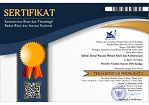Preserving Dutch colonial hegemony through incorporated islamic matrimonial system in the Netherlands East Indies
Abstract
The growth of Islamic matrimonial system in the present Indonesia was originally formulated in the 19th century of the Netherlands colonialism. There are several discourses among Dutch scholars in establishing an applicable law system since there are various legal system existed, and finally the colonial government issued legal dualism in order to preserve their hegemony. Provoked by several scholars the new constitution in 1854 was approved. In that, the Islamic matrimonial system was assimilated into Adat law and therefore the Islamic marriage system was allowed to be practiced in its own way. This Islamic matrimonial system was formed as a law under Dutch controls. Accordingly, the paper discusses Dutch hegemony system through applicable Islamic matrimony, and the development of this marriage as the formation of preserving hegemony. This paper arguably investigates Dutch hegemony system through applicable of Islamic matrimony. The analysis is guided by following questions: first, what are the reasons behind the implementation of indigenous legal institution such as Islamic marriage in preserving hegemony? Second, to what extent does the Islamic matrimony persisted within the applicable policy? The methodology is critical analysis of legal history contents, the data mainly taken from legal manuscripts which is a comprehensive view of law from a particular critical vantage point: a way of doing law, perhaps doing things with law. This paper argued that Dutch Hegemony system is poles apart from many colonialism regimes, the incorporated of indigenous legal system has become a method to subjugate indigenous power. Therefore, Islamic Matrimony developed into ways according to colonial’s interest
Keywords
Full Text:
PDFReferences
J. Ball, No Title. Sydney: Ougtershaw PRess, 1982.
J.S Furnivall, Studies in The Social and Economic Development of The Netherlands East Indies IIb, An Introduction to The History of the Netherlands India, 1602-1836,. Rangoon: Studies in The Social and Economic Development of The Netherlands East Indies IIb, An Introduction to The History of the Netherlands India, 1602-1836, (Rangoon, 1934), 16, 1934.
R. Soepomo, Hukum Indonesia Sebelum Peranf Dunia II,( Indonesian legal system before world war II),. jakarta: pradnya paramitha, 1965.
Supomo and Djokosutono, Sejarah Politik Hukum Adat (History of Adat Law policy),. jakarta dan amsterdam, 1954.
W. C. Supriad, Hukum Perkawinan Indonesia dan Belanda, (Indonesian and Netherlands Marriage Law), I. bandung: mandar maju, 2002.
P. Burke, History and Social Theory, Second edi. cambridge: polity press, 2007.
B. Fontana, “Logos and Kratos: Gramsci and the Ancient on Hegemony,” pp. 305–326, 2000.
R. Guha, Dominance Without Hegemony,. cambridge: Harvard university, 1977.
Jon Elster, Making Sense of Marx,. London: Routdledge, 1975.
J.A Hobson, Imperialism: A Study, (New York: Cosimo Inc, 2005),. new york: cosimo inc, 2005.
James C. Scott, Weapon of The Weak, Everyday Form of Peasant Resistance. London: yale university press, 1985.
M. J. Nojeim, Gandhi and King, The Power of Nonviolent Resistance,. westport: Praeger, 2004.
P. Saunders, Social Class and Stratification. London: Routledge, 1990.
C. van Vollenhoven, Het Adatercht van Nederlandsch Indie, Volume 1. Leiden: E.J Brill, 1918.
S. Gautama, Segi-Segi Hukum Peraturan Perkawinan Campuran. bandung: Citra Aditya Bhakti, 1996.
K. S. (ed) Jan Sihar Aritonang, A History of Christianity in Indonesia,. Leiden: E.J.Brill, 2008.
J. van Kan, Uit de Geschidenis van Onze Codificatie,. Batavia: De Unie, 1927.
John Ball, Indonesian Law Commentary and Teaching Materials. Sydney: sydney university press, 1985.
DOI: https://doi.org/10.18326/ijtihad.v20i1.97-114
Refbacks
- There are currently no refbacks.

This work is licensed under a Creative Commons Attribution-ShareAlike 4.0 International License.
Ijtihad: Jurnal Wacana Hukum Islam dan Kemanusiaan by http://ijtihad.iainsalatiga.ac.id/ is licensed under a Creative Commons Attribution-ShareAlike 4.0 International License








